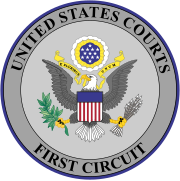| Glik v. Cunniffe | |
|---|---|
 | |
| Court | United States Court of Appeals for the First Circuit |
| Full case name | Simon Glik v. John Cunniffe, et al |
| Argued | June 8 2011 |
| Decided | August 26 2011 |
| Docket nos. | 10-1764 |
| Citation | 655 F.3d 78 |
| Case history | |
| Procedural history | Interlocutory appeal of oral denial of motion for summary judgment by defendants |
| Holding | |
| Held that a citizen has the right to film public officials in a public place; the public's right of access to information is coextensive with that of the press. | |
| Court membership | |
| Judges sitting | Juan R. Torruella, Kermit Lipez, and Jeffrey R. Howard |
| Case opinions | |
| Majority | Lipez, joined by Torruella and Howard |
| Laws applied | |
| U.S. Const. amend. I, U.S. Const. amend. IV, and Mass. Gen. Laws ch. 272, § 99 | |
Glik v. Cunniffe, 655 F.3d 78 (1st Cir. 2011) is a case in which the United States Court of Appeals for the First Circuit held that a private citizen has the right to record video and audio of police carrying out their duties in a public place, and that the arrest of the citizen for a wiretapping violation violated his First and Fourth Amendment rights. The case arose when Simon Glik filmed Boston, Massachusetts, police officers from the bicycle unit making an arrest in a public park. When the officers observed that Glik was recording the arrest, they arrested him and Glik was subsequently charged with wiretapping, disturbing the peace, and aiding in the escape of a prisoner. Glik then sued the City of Boston and the arresting officers, claiming that they violated his constitutional rights.
In a unanimous decision, the United States Court of Appeals for the First Circuit held that the officers violated Glik's constitutional rights and that the officers were not entitled to qualified immunity. The Court ruled that the right to film the police carrying out their duties in public was "clearly established," and that Glik's actions did not violate state law. However, the court also noted that the right to film public officials was subject to reasonable limitations with respect to the time, place and manner in which the recording was conducted. After losing the appeal, Boston reached a settlement with Glik in which they agreed to pay him $170,000 in damages and attorney's fees. This was the first case in which a United States Circuit Court of Appeals explicitly ruled that private citizens have a right to film police officers in public spaces. The case drew media attention across the United States, and was also cited favorably by other United States Circuit Courts of Appeals that reached similar conclusions in other cases.
